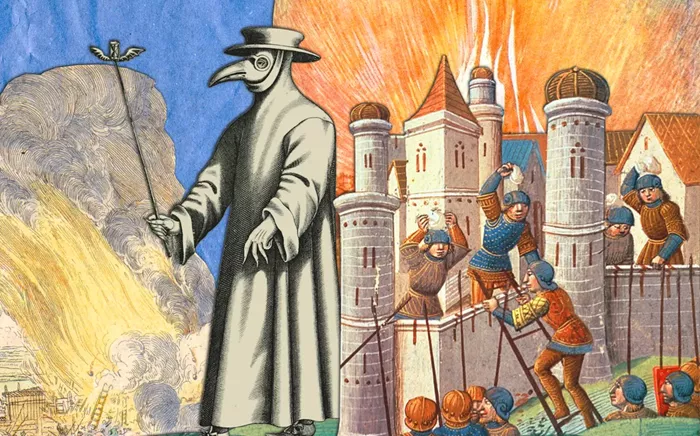Did anyone survive the Black Death? What caused the Black Death? Which plague killed 75% of the population? Find out these answers and more in this fascinating exploration of one of the deadliest pandemics in history.
1. Did Anyone Survive the Black Death?
While it’s estimated that between 30-60% of Europe’s population died, some did manage to survive the Black Death. Survivors often had a natural resistance, and many historians speculate that stronger immunity or isolation from the infected contributed to their survival.
2. What Caused the Black Death?
The Black Death was caused by the bacterium Yersinia pestis, transmitted through fleas from rats. The disease spread quickly and devastated Europe, Asia, and Africa during the 14th century. Its symptoms were gruesome, including fever, swollen lymph nodes, and black spots on the skin.
3. Which Plague Killed 75% of the Population?
The Black Death itself killed up to 75% of the population in some areas, particularly in Europe. It wiped out roughly one-third of Europe’s population in just a few years, making it one of the deadliest pandemics recorded in human history.
4. Was Anyone Immune to the Black Death?
Yes, some people appeared to be immune to the Black Death. Evidence suggests that individuals with a specific genetic mutation, the CCR5-delta 32 gene, were less likely to succumb to the disease. This genetic trait continues to be studied for its potential benefits.
5. Which Plague Had a 100% Death Rate?
The 6th-century Plague of Justinian, caused by Yersinia pestis, had a 100% death rate in some cases. If individuals were infected and did not receive treatment, death was inevitable, particularly when the plague reached large cities where it spread rapidly.
6. Did Anyone Survive the Titanic?
While not directly related to the Black Death, the Titanic disaster also has fascinating survival stories. Of the over 2,200 passengers and crew, only about 700 survived. Similarly, the survivors of the Black Death are outliers in a history marked by mass fatalities.
7. Does the Black Plague Still Exist?
Though the Black Plague is no longer a major threat, the bacteria that caused it still exist. Cases are rare but still reported in parts of the world, particularly in rural areas. Modern antibiotics have made it treatable, so it no longer has the devastating impact it once did.
8. What Disease Has Killed the Most Humans in History?
The Black Death is often considered one of the most deadly diseases in history, but it’s not the only contender. Smallpox, malaria, and tuberculosis have all killed more humans over time. The sheer scale of these diseases underscores the deadly power of pandemics throughout history.
9. What Stopped the Black Death?
Ultimately, the Black Death subsided as its natural cycle slowed. A combination of measures such as quarantine, isolation, and the decline of infected populations helped limit the spread. Over time, medical advances and improved living conditions reduced the plague’s impact.
10. What If the Black Death Never Happened?
If the Black Death had never occurred, the course of history would have been dramatically different. Europe’s population growth would have been higher, potentially delaying the Renaissance. Additionally, the social upheavals caused by the plague led to significant political changes.
11. What Event Killed the Most Humans?
The Black Death is among the deadliest pandemics in human history, but world wars have also claimed millions of lives. World War II, for example, resulted in over 70 million deaths, far surpassing the plague in terms of human loss. However, the Black Death’s societal impact was profound.
12. Why Is the Plague Rare Now?
The plague is rare today due to a combination of factors, including modern sanitation, antibiotics, and an improved understanding of how diseases spread. Advances in public health systems and faster responses to outbreaks have drastically reduced the risk of large-scale plagues.
13. Who Was the First Person to Get the Black Death?
The exact first victim of the Black Death is unknown, but records suggest that it may have spread from China, reaching Europe by way of trade routes. The first documented cases in Europe appeared in 1347, when Genoese traders brought the disease from Crimea.
14. Which Countries Were Not Affected by the Black Death?
While the Black Death spread across Europe, Asia, and parts of Africa, some remote areas escaped its wrath. For instance, some regions of Scandinavia and parts of Russia experienced lower mortality rates, possibly due to geographical isolation or lower population density.
15. Is the Black Plague Curable?
Yes, the Black Plague is curable today. With modern antibiotics, particularly streptomycin and doxycycline, patients can recover if treated early. However, without treatment, the disease remains fatal, which is why prompt medical attention is essential.
16. What Is the Fastest Killing Plague?
The fastest killing plague in history is the pneumonic plague, a form of the Black Death. Pneumonic plague infects the lungs and can be spread through coughing. Symptoms appear within a day, and death can occur within hours if not treated.
17. How Did Plague Doctors Treat Patients?
Plague doctors during the Black Death were known for wearing beaked masks, which they believed helped protect them from “bad air.” They used crude methods like bleeding, herbal remedies, and leeching. These treatments were often ineffective but were the best available at the time.
In conclusion, the Black Death remains one of the most devastating pandemics in history, yet it continues to intrigue and educate us about the fragility of human life and the resilience of those who survived.
Related topics:


